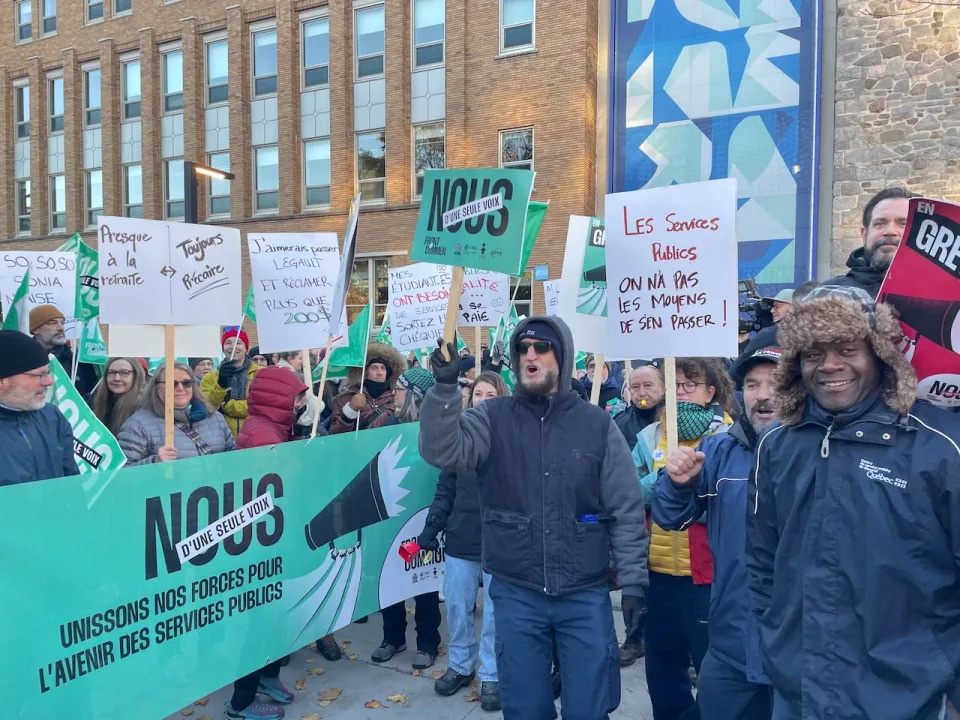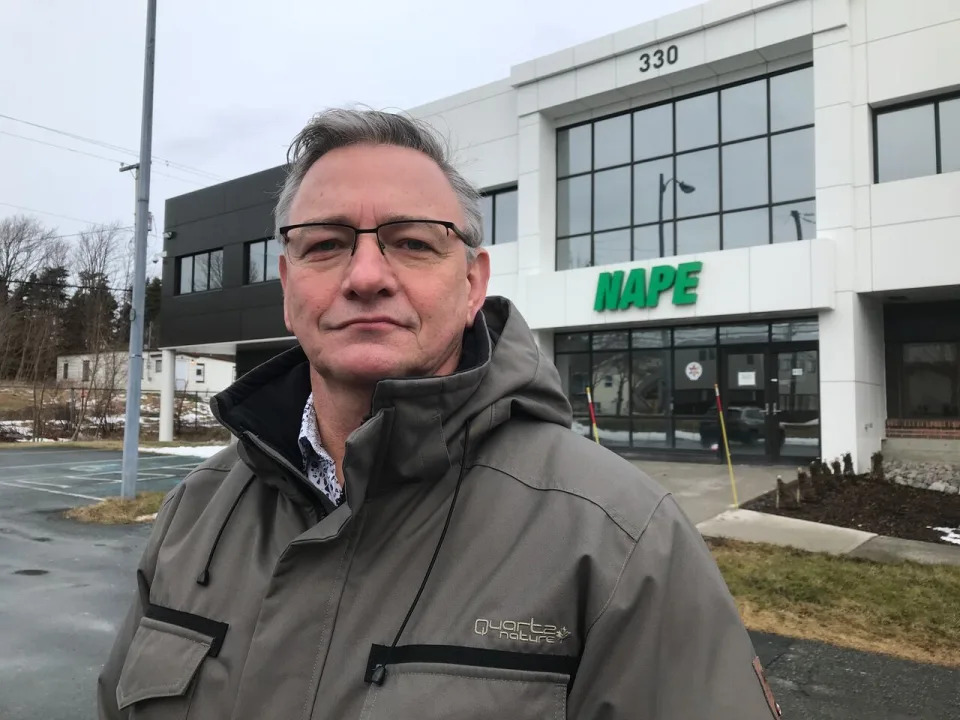CBC
Mon, November 20, 2023

An instructor at Kwantlen Polytechnic University in Surrey, B.C., claims the university has discriminated against him, and his union is also grieving a matter it says is related. (Kwantlen Polytechnic University (kpu.ca) - image credit)
A British Columbia university instructor has filed a human rights complaint against Kwantlen Polytechnic University (KPU) and two administrators, claiming the university is discriminating against him and causing him distress over concerns he could soon lose coverage for a "life-changing" drug.
Mazen Guirguis says he filed the complaint in September because he is seeing strong indications risdiplam — which costs nearly $1,000 per day — will no longer be covered after Dec. 22, but that the Surrey-based university won't tell him if his coverage eligibility has changed.
Guirguis' complaint also names KPU president Alan Davis and vice-president of human resources Laurie Clancy as respondents.
The B.C. Human Rights Tribunal has not yet decided whether it will hear the complaint, and KPU said it has not yet seen the complaint and won't comment on specifics.

Mazen Guirguis, a philosophy instructor and former dean of humanities at Kwantlen Polytechnic University, has claimed the university and two administrators discriminated against him as he worries he will soon not have coverage for an expensive drug he says has been "life-changing."
Mazen Guirguis, a philosophy instructor and former dean of humanities at Kwantlen Polytechnic, says he does not know if he will have risdiplam coverage after Dec. 22. (Submitted by Mazen Guirguis)
Guirguis, a former dean at KPU, uses a motorized wheelchair due to Type 3 spinal-muscular atrophy, a severe and progressive neuro-muscular disease that causes muscles to weaken.
He says risdiplam has been "miraculous," pausing his deterioration, improving some motor function and giving him hope to remain as independent as possible.
"It's not an exaggeration to say that I have been actually thinking about and hoping for this all of my life," said Guirguis, 53, near his home in Coquitlam, about 25 kilometres east of Vancouver.
"I'll never be able to walk again or run a marathon, but still, not deteriorating, this is quite literally a life-changing thing."
Access confusion
Guirguis says he was eager to try risdiplam when it was approved by Health Canada in 2021, but when he searched the drug in his Manulife claims portal, he says, nothing came up. The insurer said it wasn't covered and so did his union, Guirguis says.
In early 2022, Guirguis says a union representative told him he should try applying again.
Guirguis claims he contacted Manulife in June 2022 and the insurer issued him a prior authorization form that listed risdiplam in the drop-down menu of options to select.
After submitting the form and passing several tests, he was approved for 90 days of coverage in September 2022, and then for another year of coverage last December.
"It is difficult to fully describe in words the relief I and my family felt at that moment," Guirguis wrote in his complaint.
But now Guirguis says he doesn't know if he'll have coverage after his current authorization expires on Dec. 22.
He says risdiplam wasn't on the drop-down menu of the form Manulife gave him when he went to apply for a renewal in September, and a customer service representative confirmed it was the correct form.
Guirguis has applied with an older form that does list risdiplam, but has not heard from Manulife whether it has been accepted. He says KPU also has not responded to his questions about coverage.

Risdiplam, sold under the brand name Evrysdi in Canada, costs nearly $1,000 per day.
Risdiplam, sold under the brand name Evrysdi in Canada, costs nearly $1,000 per day. (Evrysdi/evrysdi.com)
"It's just sheer uncertainty," Guirguis said. "I have no idea what's going to happen."
KPU declined to answer whether its plan currently covers risdiplam or respond to a detailed list of questions about Guirguis' claims, citing privacy in an emailed statement to CBC News.
Manulife declined to comment on Guirguis' case specifically, citing privacy reasons, but said in a Thursday statement to CBC News that the company strives "to provide coverage with minimal disruption as part of our legacy commitment."
Union grievance ongoing
The issues Guirguis faces are complex, and his union, the Kwantlen Faculty Association (KFA), believes they are connected to wider concerns with an optional Manulife program, DrugWatch, that the union is currently grieving.
Launched in 2015, DrugWatch analyzes the costs and potential benefits of new medications before deciding to cover them "to help ensure value for money in a dramatically changing drug market," according to a Manulife report.
In a 2021 arbitration decision, the B.C. Labour Relations Board found Douglas College's enrolment in DrugWatch had violated its collective agreement with instructors, and ordered the institution to opt-out immediately.
"DrugWatch is discriminatory, it is unfair, and it is ethically questionable," union vice-president Diane Walsh wrote in a June 2023 email to all KFA members, shared with CBC News.

The B.C. Human Rights Tribunal office is pictured in Vancouver on March 27, 2023.
Guirguis has filed a complaint with the B.C. Human Rights Tribunal, which has not yet decided whether it will hear the matter. (Ben Nelms/CBC)
KPU would not say whether it is enrolled in DrugWatch or whether the program has impacted coverage of risdiplam, citing the ongoing grievance.
"The university cares deeply about the wellbeing of its employees and has a strong package of resources and benefits in place to support their needs," said Jenn Harrington, associate vice-president of people relations in an emailed statement to CBC News.
In a May 2023 email to Guirguis viewed by CBC News, another administrator denied that Guirguis' access to risdiplam had been impacted by DrugWatch, and blamed the prior authorization process for the delay he described.
But Guirguis says prior authorization has never been an issue and the response misconstrued his concerns.
Ineligible for public coverage
While not considered life-threatening like other types, Type 3 SMA is a disease that can drastically reduce quality of life, causing muscle and joint aches, spine curvature, difficulty walking and disruptive tremors.
There are up to 2,140 cases of all four types of SMA combined in Canada, with about 35 new cases per year, according to a 2021 study.
Unlike in Saskatchewan and Quebec, Type 3 patients aren't eligible for public coverage of risdiplam in B.C.
Provincial coverage for the drug is limited to about 33 eligible children and young adults under 25 who suffer from life-threatening Types 1 and 2 SMA, which lead to much shorter lifespans, according to a 2022 statement from the ministry of health.
The ministry cited a 2021 finding that there is limited clinical evidence about risdiplam's efficacy for older adults by the Canadian Agency for Drugs and Technologies, an independent non-governmental organization that advises government and insurers on pharmaceutical coverage.
In an emailed statement to CBC News, a health ministry spokesperson said the ministry has "a rigorous scientific and evidence-based review process to ensure that coverage is provided for drugs with evidence of clinical, safety and cost-effectiveness benefits while ensuring sustainability of the drug plan."
Uncertainty looms

Guirguis says the uncertainty around his drug coverage after Dec. 22 amounts to 'cruelty.' (Submitted by Mazen Guirguis)
Guirguis says the drug has changed his life, and if his Manulife coverage eligibility ends, he will apply for the province to cover the medication.
Some people with SMA may be granted coverage under the health ministry's Expensive Drugs for Rare Diseases program, but applications "are considered on a case-by-case, last-resort basis," said the spokesperson.
Guirguis has also applied to fast-track his complaint at the backlogged B.C. Human Rights Tribunal, and is seeking an interim order for KPU to withdraw from DrugWatch until the matter is settled.
But with waits up to a year for the tribunal to review a complaint, it's unlikely it will be resolved until long after his current coverage authorization expires.
Guirguis says the uncertainty he is facing amounts to "cruelty."
"I have a moral obligation to stand up for this," he said.
"Even if I was guaranteed to have coverage for the rest of my life … it could be anybody else that had a similar condition next time."











